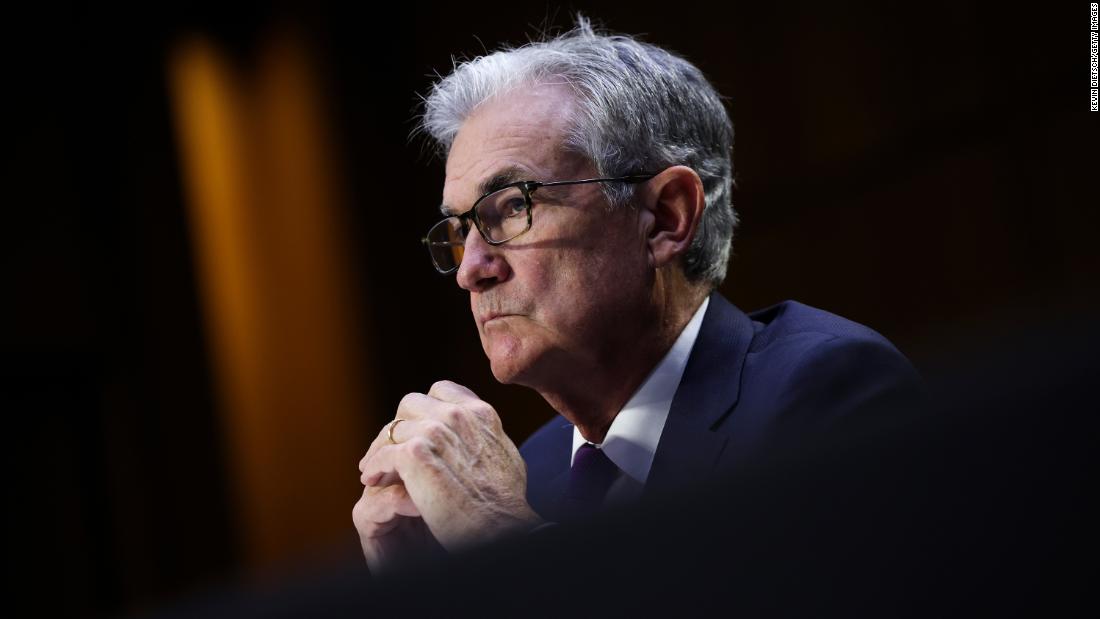Analysis: Jerome Powell is having a week from hell. And it’s only Wednesday
And it’s only Wednesday.
‘Grave concern’
To be fair, most of these issues could resolve themselves soon enough. Many expect Congress will avoid a potentially catastrophic default by raising the debt ceiling — eventually.
Still, Warren’s dramatic announcement Tuesday that she will oppose Powell’s renomination narrows the chairman’s path to staying at the helm of the Fed.
Warren is the highest profile lawmaker yet to take a stand against Powell and it’s easy to see how some other progressive senators will follow suit.
“Powell remains the favorite, but his chances have clearly gone from a sure-bet to a lower probability,” said Ed Mills, Washington policy analyst at Raymond James.
In her patented prosecutorial style, Warren slammed Powell’s track record on regulation, arguing he presided over a weakening of oversight on big banks.
“Your record gives me grave concern. Over and over you have acted to make our banking system less safe. And that makes you a dangerous man to head up the Fed,” Warren told Powell during a Senate Banking Committee hearing.
Trading scandal
The Fed chief is also playing defense after stock trades made by two regional Fed presidents raised questions about the central bank’s ethics policies.
Powell himself conceded the rules are “not working” and must be revamped, adding that officials are “looking carefully” to make sure the trades in question complied with the law.
“This is a blow to the image of the central bank,” Democratic Senator Raphael Warnock told Powell.
Energy spike doesn’t help ease inflation worries
It’s not clear how much everyday Americans will care about these questionable stock trades, or the intricacies of big bank regulation. But they do care about inflation — and the sticker shock isn’t getting any better.
In recent days, attention has turned to energy price spikes.
Peter Boockvar, chief investment officer at Bleakley Advisory Group, agrees that Powell is “dangerous” — although not because of his approach to regulation.
“He instead is a dangerous man because [of] what he and his colleagues have done with monetary policy,” Boockvar wrote in a note to clients, pointing to “widespread inflation” and financial market “distortions” that the Fed’s zero interest rate policies and bond-buying programs helped create.
Didn’t Powell help save the economy?
To be sure, Powell’s guns-blazing response to the Covid crisis may have helped avert an even bigger disaster.
Many economists and lawmakers believe the Fed’s swift and extremely aggressive steps in March 2020 prevented the Covid recession from morphing into a depression or full scale financial meltdown.
“Powell deserves an incredible amount of credit. Most in Washington give him that credit. That’s why he has broad bipartisan support,” said Mills, the Raymond James analyst.
Powell reiterated this week that it soon may be time to “taper” the Fed’s asset purchases — in no small part because of inflation concerns.
‘Is Powell transitory?’
While Powell has long insisted that these price spikes are likely “transitory,” he struck a more cautious tone Tuesday in regards to the elevated levels of inflation gripping America.
“The supply-side restrictions that are so much at the heart of the inflation we’re seeing have not only not gotten better, but in some cases they’ve gotten worse,” Powell told lawmakers. He pointed to crippling congestion at Los Angeles ports and computer chip shortages that have derailed auto manufacturing.
Republican Senator Pat Toomey warned that the US economy is facing a “more troubling kind of inflation” today than it has previously.
Asked by Toomey if inflation now seems broader and more structural than earlier this year, Powell agreed, saying “It’s fair to say that it is.”
Powell reiterated that the Fed believes the supply bottlenecks will fade, which will allow inflation to ease. But he added, vaguely, that the Fed has “tools” to deal with inflation should it become more problematic.
“The only tool that we can think of is raising interest rates until they slow the economy or cause a recession,” Ed Yardeni, president of Yardeni Research, wrote Wednesday in a report titled, “Is Powell transitory?”
Powell may yet recover from this week and go on to manage a deft exit from the Fed’s Covid-era policies.
And if he doesn’t, the past few days will be remembered as a turning point.
![]()


